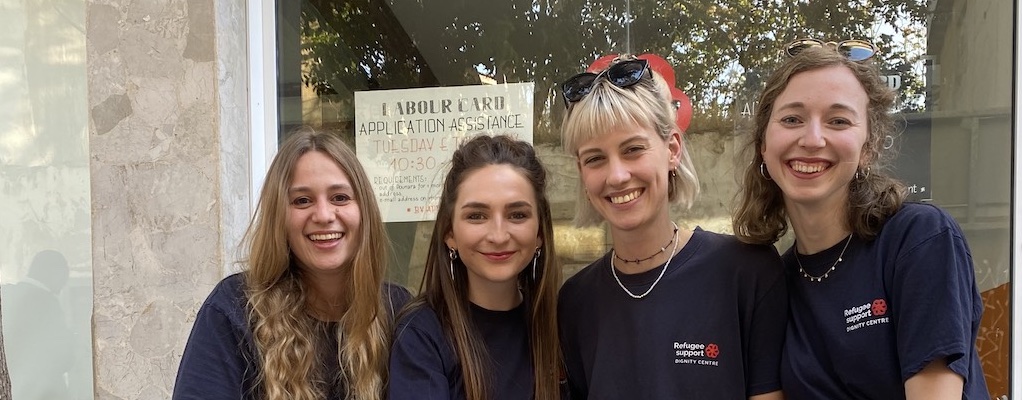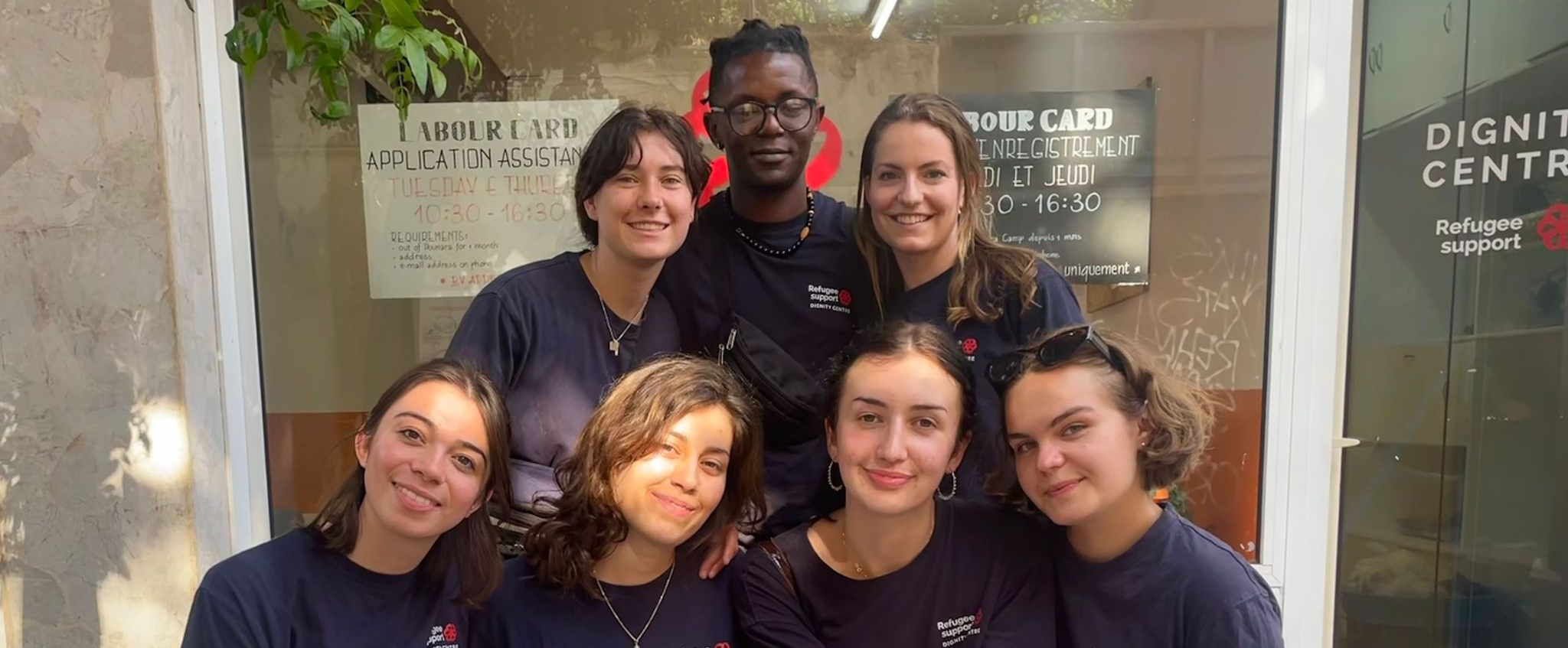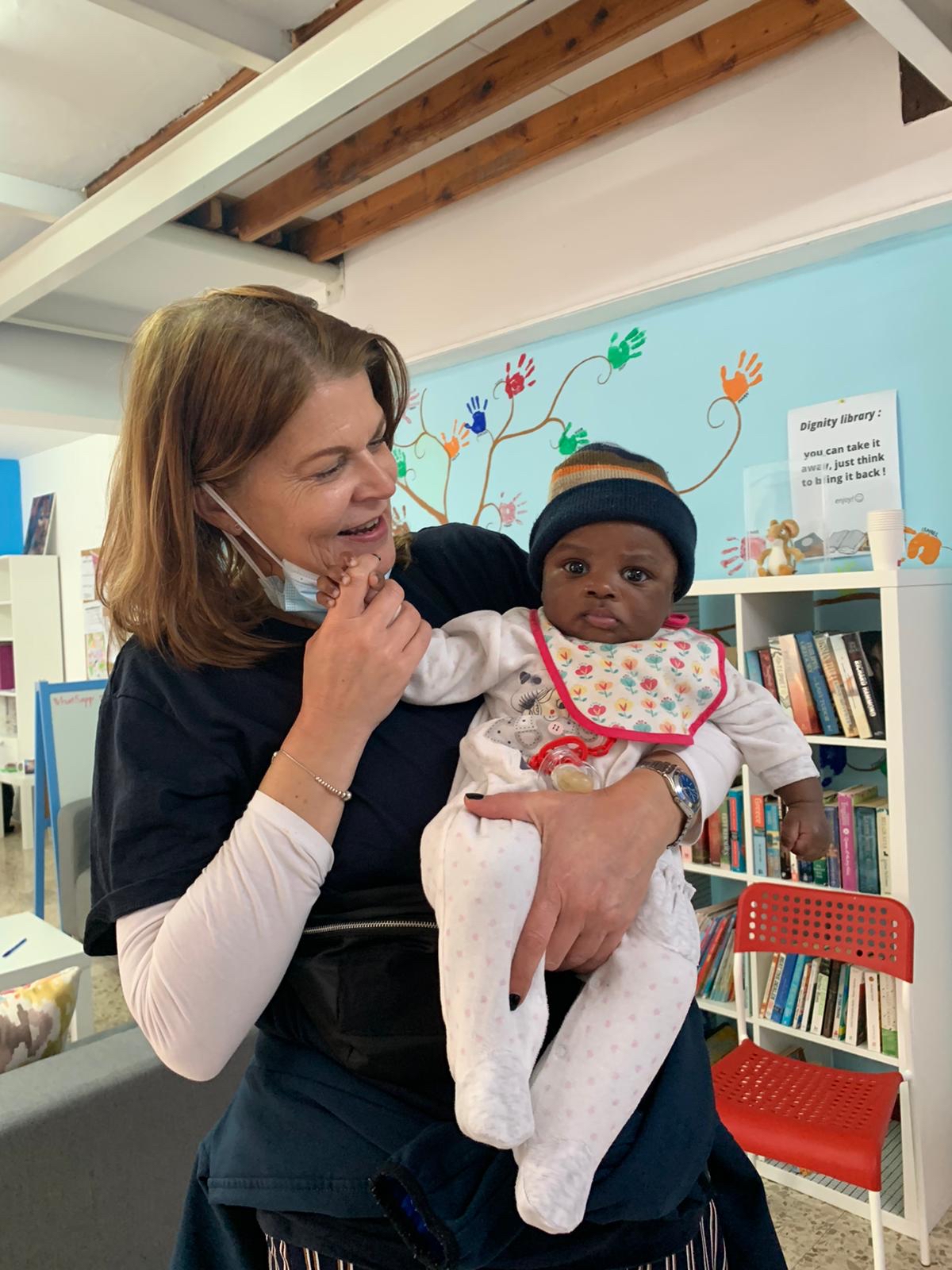I’m sitting at Thessaloniki airport, eating a now familiar but very unhealthy and still not nameable pastry-cheese combination. I’m waiting for my flight back to Gatwick, to be reunited with my family.
I’ve been in Greece for just under a week, volunteering with Refugee Support, an NGO that’s been working in two camps here in the North of the country for nearly 10 months.
Two hours ago I was standing in Alexandreia refugee camp. There, 420 people — families without fathers, fathers without their families, and unaccompanied minors — are waiting indefinitely to see whether they’ll be granted asylum.
The asylum process involves a long, complicated form that they have to fill in, listing the seven countries where they’d like to apply, in order of preference. Many of the camp residents have family in other countries, who have already had it granted, or who simply made it further into mainland Europe, smuggled across borders in varying degrees of safety and comfort.
Qualified doctors, graduates and engineers are often given asylum straight away, although their families are often not automatically included unless they have similar skills. Less educated people are usually rejected out of hand.
This leaves fatherless families, and men without their wives and children on the camp. When you’re working here, in the shop or hanging about waiting to leave for the end of the day, you might strike up a brief conversation with one of the residents. They’ll often ask if you’re married and have kids, I’ll explain I have two kids and a wife back in England. And then they might say: my wife and two children are in Germany, I haven’t seen them for three months.
It’s hard to know how to respond.
Sitting here in the airport, ready to wave my passport at a grumpy official and step on to a plane to wherever I want, this feels like a very harsh contrast. The Syrian residents of Alexandreia have no freedom of movement.
Unless things dramatically change back in Syria (not looking likely), or Europe changes it’s attitude towards refugees, they have no idea how long they’ll be living in temporary camps, or at best in a different country to their spouse or kids.
Keeping a distance
Two days previously, a young lad on the camp asked me: “When are you leaving?”
We had chatted a bit the day before — he was interested in Kung Fu, and I’d had a go at organising some martial arts lessons for the children’s activities (a chaotic afternoon where I’d been a typically overenthusiastic and clueless new volunteer, trying to deal with language barriers and understandable apathy, running round the grounds in circles like a plonker shouting ‘Kung Fu? Kung Fu?’ watched on by bemused children).
 Me, not teaching Kung Fu — photo by Paul Hutchings
Me, not teaching Kung Fu — photo by Paul Hutchings
This chap told me he was into Bruce Lee and I’d talked about different styles of Kung Fu and demonstrated a bit for him.
As he asked when I was leaving, and I had to explain that it was in two days time, I read so much into his far away look and nervous glances. It’s all assumed on my part, but the sudden realisation that I could leave at any time, go anywhere I liked and get pretty much whatever I wanted, slammed home like a 12-tonne truck.
I’ve only been here for a week — it’s a very small amount of time compared to other volunteers. Refugee Support try to limit people’s stay to 3 weeks, to avoid them burning out, or forming close attachments with adult and child residents.
We have strict instructions about how to guard against getting involved in people’s lives — not so much to protect the mental wellbeing of volunteers, but for that of the residents. Imagine forming close friendships with people who show care for you in a harsh situation, who then regularly disappear, never to come back again.
Like many of the things you’re told or experience on camp, you suddenly realise how everything is complex. What seem like good intentions can do more harm than good.
One or two of the volunteers have been here for longer — working in coordination roles. Like some of the day-to-day workers, they’ve had experience of previous camps on Greek Islands or working around the orphanages and hospitals in places like Southern Turkey.
They have some distressing stories to tell, of working on the beaches as people landed, or of seeing the casualties of the war in Syria in the orphaned children or horrific injuries sustained in the fighting.
Here, the situation is different. It’s not the same level of shock and distress. We’re not helping people off boats or dealing with severed limbs.
But there’s a different kind of distress that you feel. It’s the one caused by the apathetic, creeping bureaucracy that seems to be life as a refugee in Europe. From the complex asylum process, regular rejections and tales of backhanded dealings that leave refugees sometimes literally out in the cold, with unfit equipment or without basic supplies that could easily be brought in.
Alexandreia is one of the better situations to be in. Speaking to employees of the IRC and UNHCR, along with other Northern Greek camps, it has a reputation of being a better place to be.
Residents live in Isoboxes rather than tents, have gas heaters and have a number of services that they might not have anywhere else.
 An example of an Isobox — this one unoccupied.
An example of an Isobox — this one unoccupied.
These are largely thanks to Refugee Support (RS), who I’m volunteering with. Set up by John Sloan and Paul Hutchings, the organisation works alongside the military, UNHCR, the IRC and other NGOs on the camp. While the other teams look after registering people, providing bedding and an Isobox or looking after basic healthcare and children’s education, the purpose of RS is to provide care and dignity to life here.
Last April, John stood at the gates of the camp for three hours as 50 refugees were ushered off the coaches:
I could see about 50 refugees getting off a bus looking very confused as to what was happening to them and I just wanted to go in and help and tell them I felt their pain. I stood at that gate for 3 hours waving at them it must have seemed very weird. Eventually Captain Jim came over and spoke to me through the gate to ask me what exactly it was I wanted, I explained that I simply wanted to help them, I told him I had just spent 7 months working in Calais and felt I might just be of some use to the Army as they moved people into the camp. Captain Jim understood and let me enter.”
This story (a fuller account here), to me sums up John and the RS operation to a fault.
Beyond basic needs
Coming on to the camp last Friday, straight from the airport into the food service, which was taking place in the kitchen that they set up, run by volunteers and residents, you immediately felt the energy, care and connection.
 The kitchen at Alexandreia — photo by John Sloan
The kitchen at Alexandreia — photo by John Sloan
The camp’s self-selected head-chef passed me a plate of Syrian food that the team had cooked, while Turkish pop blared in the background and a group of five people from the UK, Syria, Spain and the US worked like a well-oiled machine, putting hot food into boxes to pass to residents waiting the other side of a serving hatch.
Refugee Support had the kitchen put in, after raising the money from donors, negotiating with the army (who run the camp) and pulling in local tradespeople. It sources the ingredients and runs the kitchen, working closely with residents to provide authentic Syrian food.
Over the other side of the camp, the Boutique provides a wide selection of clothing, from RS’s nearby warehouse, set out beautifully for residents to choose from. Volunteers walk the site, giving people tickets to visit the Boutique with a dedicated slot, so that they have privacy to browse and try on clothes.
Similarly, two doors down, the Shop provides some basic food items, a lot like a mini-supermarket. Residents are allocated weekly points, which they come to spend. Again, they have an allocated time to come, and get to shop alone. It stocks things like fresh fruit and veg, tinned food and spices, alongside nappies and sanitary items which are offered for free. All bought by or donated through Refugee Support.
 The camp food shop, set up, supplied and staffed by Refugee Support.
The camp food shop, set up, supplied and staffed by Refugee Support.
Each afternoon, English classes take place in the classrooms that have been set up. Regular ‘Women’s Time’ give the camp’s female residents some space for themselves. And the camp now has a playground, with swings, a slide and other equipment, which is almost always in use by the littlest residents.
What they’ve achieved and what they’ve created as a result, is quite incredible. To you or I it might sound pretty basic or simple, but in amongst the complexity of camp dynamics and the various agencies, setting up and maintaining these services requires determination and stamina. And for residents, I can only imagine the difference is huge — from having just your most basic needs met, just about surviving, to having access to a few goods and services that provide a more dignified existence.
And, when this is your home for the forseeable future, receiving rejections from authorities, hearing harrowing news from home and wondering when you’ll ever be able to see your husband or father, at least there are some people here, on site, everyday showing respect and care.
This sense of care is the more subtle but powerful impact that Refugee Support has here.
In the face of Europe’s (and especially the UK’s) sometimes pitiful response to the ongoing crisis, smiles, tea and biscuits might not sound like a big deal.
But this is about the lives of individual human beings, not just politics and activism.
This is also about care, dignity and compassion, person-by-person.
Mixed emotions
After just one week, I’m blown away by what I’ve seen, feeling inspired, sad and angry about what I’ve experienced. I’m feeling very mixed to be heading back to the UK.
While I can’t wait to see my kids and wife, the volunteers and residents who’s lives I’ve passed through are with me, right now.
There’s a certain wretched feeling that I can’t quite describe.
And I can’t imagine not being involved.
From behind our TV screens and newspapers, we might feel some sadness and despair, but I realise now that it still feels far away.
From here in Greece, it all feels very close and very, very real.
And while everything I’ve described about these people’s situations can lead you to feel a sense of pity or see them as victims that we need to rescue, when you’ve spent some time here, it’s clear that we are all the same.
These people deserve our respect, support and advocacy, not our pity and hand-wringing.
While we might not speak the same language or wear the same clothes, we are fundamentally the same. We enjoy the same things, we used to lead very similar lives. We have all the same needs.
On Tuesday, as I was working in the shop, a mother dressed in an Abaya brought in her husband and two-year-old. As the beautiful, curly-haired child started flipping out and wouldn’t be settled, she got increasingly stressed.
I told her I had one just the same and showed her a picture, making it clear I knew just what it was like to have a screaming, violent midget with you when you just wanted to do your shopping.
While her and my lives are so different, and I can’t imagine what it’s like to be in her situation — there was a clear sense of relief in the understanding I could offer.
I managed to placate the little sausage by making a paper airplane, and chasing him round the shop. In a small way, this is what we offer, a sense of understanding, connection and very light support, just by showing we care.
But still, here I am in Thessaloniki airport, waiting for my flight.
If you can, consider volunteering, or donating to Refugee Support. Whatever you can do, try and have a hand in showing that human beings care.



